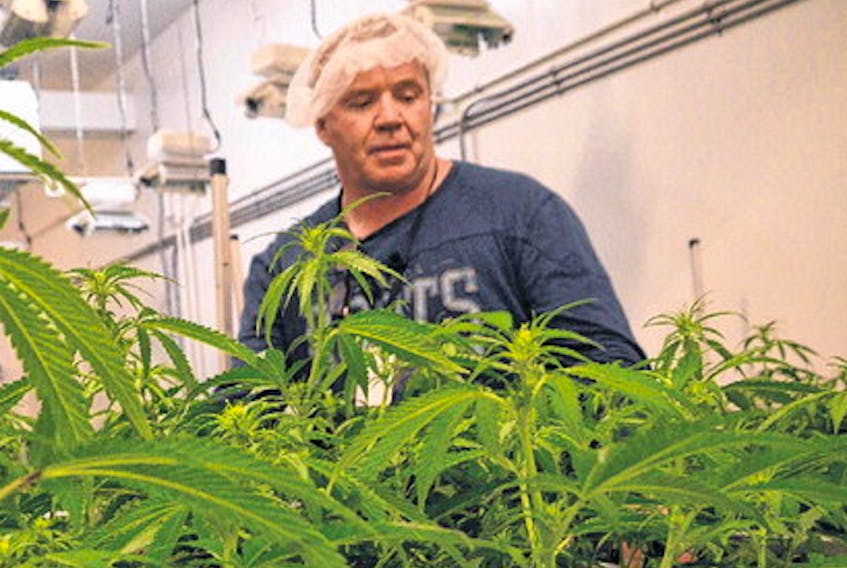Antigonish County’s newest cash crop was flowering on Friday.
Two of Highland Grow Inc.’s three production rooms had maturing marijuana plants.
Meanwhile, samples of the company’s Highland Grown from two consecutive crops have been tested and passed by a Health Canada certified lab.
On Friday morning, the company’s president and head grower, Frank MacMaster, sent a request to the federal regulator for a final inspection, required before the company can get a seller’s license.
“I’m hoping a week to a week and a half on that,” said MacMaster.
That puts Highland Grown near the front of the line for seller’s among this province’s licensed growers.
Marijuana is set to become big business with the coming legalization of recreational marijuana on Oct. 17.
Just over a week ago the Nova Scotia Liquor Corp. put in its first order for 3.75 million grams of cannabis. Though 14 Canadian producers, including two from Atlantic Canada, will supply the 282 products — including bud, seeds, pre-rolls, oil and gel caps — none were from Nova Scotia because none of this province’s producers have a seller’s license from Health Canada.
“We are in talks with the NSLC and we are looking forward to doing business with them as soon as we are licensed to sell,” said MacMaster.
Highland Grow is not stopping with its 7,000 square foot operation currently in production. Its parent company, Biome Grow, which is currently building large marijuana growing facilities in Newfoundland and Labrador, and Ontario, is going public in September to raise capital for further expansions.
“Lets put it this way — we have 20 acres (eight hectares) in Antigonish County with an option for 40 acres (16 hectares), at a minimum we are going to use the full 20 acres,” said Khurram Malik, president of Biome Grow.
It’s an investment worth tens of millions of dollars in Antigonish County, he says, as the company seeks to grow fast to become a top competitor out of the gate when the flag drops on Oct. 17.
There are about 115 licensed growers of marijuana in Canada currently and Malik projects that number to raise to about 230 by 2020. That’s when he and most analysts are predicting supply will begin to pass demand in the Canadian market. “It’s tremendously capitally intensive per square foot to build to produce right now and most who are building are doing that in the hopes that they will be able to sell what they grow when they grow it,” said Malik.
“And until 2020 that will probably work. But once supply catches up it will start getting problematic for the small and medium sized guys to compete with the bigger players that have balance sheets and distribution networks.”
Biome Grow has been working to line up export contracts to Germany and Israel, where medical marijuana is being adopted.
While the last regulatory hurdle seems to be nearly crossed and there are already big plans for further expansion, marijuana is still a crop. But it’s agriculture performed under intense security reminiscent of a Mission Impossible movie.
As MacMaster goes between rooms he radios security to disarm an alarm, then he swipes a pass key and enters a password. The building is surrounded by chain link fence topped with razor wire and watched at all angles by constantly monitored cameras.
Inside the propagation room, Joseph Cameron was nodding along to Tragically Hip while placing each young clone into pots and labelling them with their variety and an identification number.
In another room, which requires more calls to security and passcode and keycards, Jacqueline Gillis is tending to plants.
“We control carbon dioxide, humidity and temperature to a point that it is a perfect environment for these plants,” said Gillis, a recent graduate of Dalhousie University’s Agriculture Campus in Truro.
The plants aren’t grown in soil but in what Gills calls “a media” of components that offers only what the plants need. Everyone goes through a foot bath on their way in to the facility to avoid outside contaminents.
“To find a job in my field in Antigonish is really exciting,” said Gillis, born and raised in the town.
“All my training was to do something like this.”
MacMaster expects employment at his facility to grow from its current 14 people to 50 with the expansion plans that will be laid out in more detail over the coming months.









